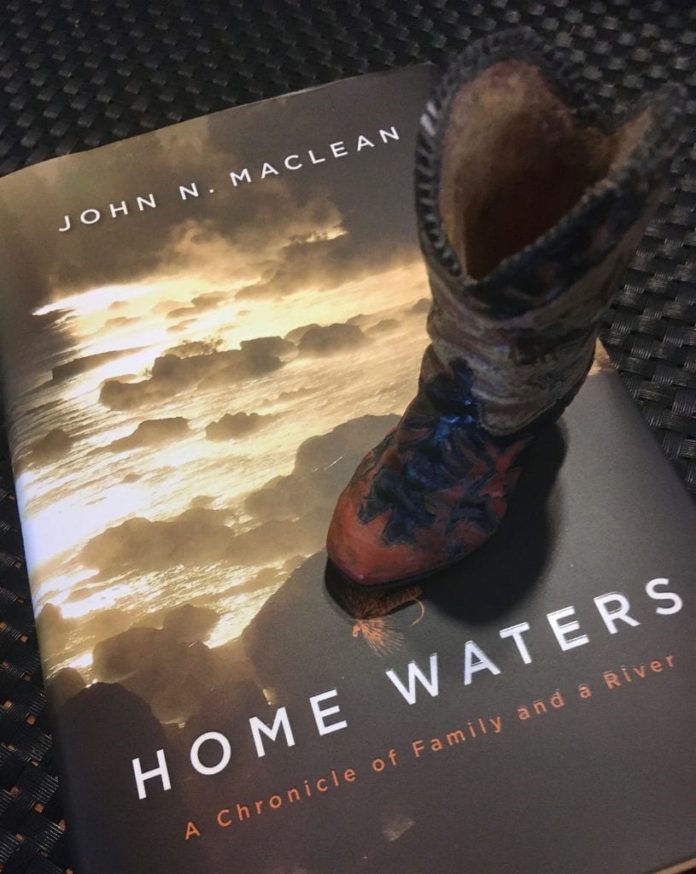True West
By June Sawyers
One Sunday afternoon a number of years ago I found a finger puppet lying outside Maclean House, the former dormitory (now apartments) named in honor of the late Norman Maclean, who was a popular English professor at the University of Chicago and the author of the modern classic and unexpected hit, A River Runs through It. The puppet lay there, by the side of the curb, looking rather forlorn despite its grin, and presumably dropped by a child—a small green dinosaur with a yellow spine. Did that child ever miss it, I wondered? I felt sorry for the imaginary youngster but glad that I was able to “rescue” it.
I thought about that finger puppet as I was reading John N. Maclean’s memoir Home Waters: A Chronicle of Family and a River and his memories of driving with his family to Montana as a child. Maclean is the son of Norman Maclean. He is also a former newsman at the Chicago Tribune.
His writing is as precise and lyrical as his celebrated father. He writes about the simple pleasures of fishing with his dad on the Blackfoot River until they ran out of daylight. A chronicle of family and place, it is modest and subtle but also compelling and profoundly moving.
Maclean’s grandfather and namesake was the Rev. John Norman Maclean, a formidable figure. Use the fewest words possible, the Reverend told Norman as a child. Anyone who has read Norman Maclean’s novella or seen the movie adaptation by Robert Redford will recall the scene when a young Norman hands a piece of paper to his father, played in the film by a sympathetic Tom Skerritt. The reverend looks it over and returns it to his son. “Half as long,” he says. The adult Norman recalls this without sentiment or exasperation. His reverend father “taught nothing but reading and writing, and, being a Scot, believed that the art of writing lay in thrift.”
The Reverend’s grandson learned that lesson too.
The distance between Chicago to Montana is long, but what brought the Macleans together was the family cabin. A log cabin built in the 1920s by earlier generations of Macleans, at a place called Seeley Lake, some 55 miles northeast of Missoula. It was a refuge, a sanctuary, but above all, a home. Rev. Maclean conducted marriages and baptisms there.
Virtually every year, in late June, the Macleans left Chicago behind to begin the long drive westward, towards Montana. “The four of us—my parents; my sister, Jean; and me—squeezed into a car as encumbered with baggage as a pack mule loaded for the backcountry,” writes John Maclean.
For the Macleans “True West” began once they crossed the Missouri River in a small town called Chamberlain, SD.
Reading those lines reminded me of another time, a few summers ago when we drove west too, following the western sun towards Wyoming. Once we arrived in Chamberlain, we stopped at Casey’s, a diner overlooking the river. After devouring a juicy hamburger, we began the journey again. As we crossed the wide Missouri, I played Bruce Springsteen’s sensitive rendition of the traditional American folk song “Shenandoah,” its rhythms as gentle and rolling as the river we just crossed.
Shenandoah, I love your daughter
Away, you rolling river
I’ll take her across the water
Away, we’re bound away,
Cross the wide Missouri
 “As you come down the hills to the river,” Maclean writes, “you leave behind the lush farmland of the Middle West and see across the river the rolling brown hills of the Great Plains stretching to the horizon.”
“As you come down the hills to the river,” Maclean writes, “you leave behind the lush farmland of the Middle West and see across the river the rolling brown hills of the Great Plains stretching to the horizon.”
Maclean recalls passing by other landmarks too—modest though they may be––that we also saw on our journey such as Wall Drug, seen in the Academy Award-winning film Nomadland. Outside its doors stands a replica of an 80-foot Brontosaurus, and beyond lies the otherworldly Black Hills. In retrospect Wall Drug is yet another reminder of the dinosaur finger puppet, the piece of yarn that you will not be surprised that I call Norman, and that now sits on my shelf next to a copy of A River Runs through It. It was also there at that roadside tourist attraction that I bought for the sum total of $3.98 a miniature cowboy boot, decorated on each side with a bucking bronco. That too is on the shelf next to Maclean’s novella.
As anyone who has read Norman Maclean’s work knows, fly-fishing along with the Presbyterian religion he grew up with are intertwined in family lore. Fly-fishing was also an indelible part of John Maclean’s youth. He went on his first fishing trip when he was seven years old (his first trout was a rainbow—the Blackfoot River’s signature fish, he proudly notes). He still fishes to this day. ”How did we become a fishing family?” he asks. It didn’t seem to be in the Maclean genes.
In Scottish Gaelic Maclean means “son of the servant of St. John.” The Macleans hailed from the Isle of Coll, one of the Inner Hebrides and located less than a dozen miles from the Clan Maclean stronghold on the Isle of Mull. John tells us that Laughlin Maclean, a carpenter, emigrated from Scotland to Nova Scotia in 1821, with his wife, Elizabeth Campbell, and traveled in an open boat from Cape Breton Island to the town of Pictou on the Nova Scotian mainland. As an aside, Pictou was also the site of the landing in 1773 of the Hector, the Canadian Mayflower, when the first major migration of Scottish settlers arrived in Canada. (There are, of course, many other prominent Scottish Macleans, including the the late Gaelic poet Sorley Maclean, singer-songwriter Dougie Maclean, and the artist Will Maclean and his director son, John Maclean, to name but a few.)
After a spell in Manitoba and studying at a seminary in California, Maclean’s grandfather eventually became the pastor of the First Presbyterian Church in Bozeman, MT, a rough and rowdy town of cowboys and loggers and miners. It was here where Norman was raised and here where he became a self-proclaimed “tough choirboy.” Maclean’s West, like the Scotland his people left behind, was big with vast stretches of empty landscapes but also unforgiving and yet somehow fragile.
Growing up, Norman Maclean appreciated a good story and good storytelling. He especially liked the nights out west where he listened to stories around the fireplace like the bards of old.
Norman and now his son, John, are writers who follow in the grand tradition of such Western writers as John McGuane, A. B. Guthrie, Wallace Stegner, and especially Ivan Doig. Doig was a fellow Scottish-American who wrote This House of Sky, a luminous memoir of growing up among the sheepherders of western Montana. The Macleans’ works recall the cowboy novels of Larry McMurtry as well as, in their quiet way, the writings of Kathleen Norris, Gretel Ehrlich, and Annie Proulx, especially the character of Proulx’s lonesome cowboy, Ennis Del Mar in her short story “Brokeback Mountain.” In my mind, the world of the Macleans also remind me of Robert Redford’s movies set in the modern West from the stoic former rodeo star in The Electric Horseman to the once-shy twice-bitten Montanan in The Horse Whisperer to the gruff Wyoming rancher in An Unfinished Life.
Fly-fishing is an art but also a code of conduct, a way of behaving. The Montana Macleans followed their own code of conduct. The code has many names. Wallace Stegner called it the Western code, Gretel Ehrlich the cowboy code. Whatever the term, it refers to roughly the same thing: a way of being that honors particular traits, including honesty, straightforwardness, hard work, and modesty. You could also add stoicism, endurance, toughness, and resiliency. Humor too.
In the West, people can be tight-lipped. Solitude can do that too you. As Ehrlich writes in her masterpiece The Solace of Open Spaces, “Conversation goes on in what sounds like a private code; a few phrases imply a complex of meanings.” Norman Maclean and his wife Jessie brought these traits with them when they came to Chicago. To his fellow scholars at the University of Chicago they were a pair of Montana “exotics.”
A big part of the code is to do something very well. Paul Maclean, Norman’s brother and John’s uncle, did something extremely well. He was a sublime fly fisherman.
But being good at something was not always enough. And it was that lacking of something that led to Paul’s downfall. Some people cannot be helped or accept help when they need it, the Macleans believed. Sometimes they don’t even know that they need it. That was Paul’s fate and the overarching theme in the Maclean family story.
 Paul Maclean, played by a young Brad Pitt in the film version, is the figure that lies at the mysterious heart of the Maclean clan. His physical presence may have disappeared but his spirit was ever present. The Macleans are a tight-lipped bunch. They cared for each other but didn’t make a fuss about it. Much was left unsaid. All John Maclean initially knew from his father was that his uncle had been murdered. There was no discussion, no philosophical explanation, just the brutal fact of a life snuffed out before his time. He died young and did not leave much behind—a few artifacts––but Norman Maclean made sure that he would not be forgotten. Instead Paul is remembered as “the charming rebel, doomed but beautiful and gifted with a fly rod.”
Paul Maclean, played by a young Brad Pitt in the film version, is the figure that lies at the mysterious heart of the Maclean clan. His physical presence may have disappeared but his spirit was ever present. The Macleans are a tight-lipped bunch. They cared for each other but didn’t make a fuss about it. Much was left unsaid. All John Maclean initially knew from his father was that his uncle had been murdered. There was no discussion, no philosophical explanation, just the brutal fact of a life snuffed out before his time. He died young and did not leave much behind—a few artifacts––but Norman Maclean made sure that he would not be forgotten. Instead Paul is remembered as “the charming rebel, doomed but beautiful and gifted with a fly rod.”
In Home Waters, John Maclean reveals more details about his uncle’s death. He was not killed in Montana, as portrayed in the movie adaptation but rather in a dark alley on a Sunday night in May 1938 in Chicago: specifically, in the Woodlawn neighborhood, not terribly far from where his scholar brother Norman taught and where Norman and his wife Jessie lived on Drexel Avenue. No one was found, no one was charged. The police called it a robbery gone bad. A cold case.
Home Waters is also somewhat of an origin story, and the story of how A River Runs through It came to be.
One stormy fall day in another cabin located on a sandy bluff on the shores of Lake Michigan (it was actually a “frame two-bedroom summer house”), Norman “shyly” handed over a long typewritten story to John and his wife Frances. Norman seemed nervous (“vulnerable in a way I’d never seen before,” observes John). After reading it, John told his father that he hadn’t read anything as good since Shakespeare and definitely nothing as authentic about fishing since Ernest Hemingway’s short story “Big Two-Hearted River.” Not a word should be changed, he said. Norman sat back in his chair, “relieved and gratified.” He especially liked that his reporter son compared his writing to the best of Hemingway.
Norman Maclean was about to make his writing debut at the grand young age of 74, words written down in the rhythms of the King James Bible that he knew so well. And to make a unique situation even more unique, the publisher, the University of Chicago Press, had never released fiction before. Published in 1976, the first printing was 1,500 copies but a second printing of 3,500 flew off the presses. The Press had a surprise hit on its hands. The movie was released in 1992, two years after Norman’s death.
John Maclean still fishes on the Blackfoot River although nowadays mostly by himself. That’s not quite true. He still feels the presence of the generations of Macleans who came before him.
Home Waters is not a memoir in the conventional sense—there are no wild-eyed confessions or even personal revelations that do not attend to the matter at hand. There’s nothing flashy about it. But it is heartfelt. It’s about telling stories and making sense of the world and it’s about a culture that values understatement and restraint. Specifically, it is a meditative book about a Scots family with an abiding love and deep knowledge of a particular place in the world, Montana. It is also a lovely portrait of the passage of time, of lives lost, and lives remembered. Ultimately, though, it is about the power of memory and the importance of bearing witness.
John N. Maclean, Home Waters: A Chronicle of Family and a River, is available at most bookstores and through the Custom House/HarperCollins site.
Related
Credit: Source link































